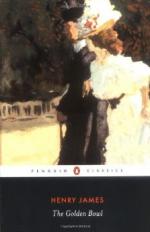“Go to Mrs. Verver, my child—
you
go: you’ll find that you can help her.”
This didn’t come, however; nothing came but
the renewed twiddle of thumbs over the satisfied stomach
and the full flush, the comical candour, of reference
to the hand employed at Fawns for mayonnaise of salmon.
Nothing came but the receding backs of each of the
others—her father’s slightly bent
shoulders, in especial, which seemed to weave his spell,
by the force of habit, not less patiently than if
his wife had been present. Her husband indeed
was present to feel anything there might be to feel—which
was perhaps exactly why this personage was moved promptly
to emulate so definite an example of “sloping.”
He had his occupations—books to arrange
perhaps even at Fawns; the idea of the siesta, moreover,
in all the conditions, had no need to be loudly invoked.
Maggie, was, in the event, left alone for a minute
with Mrs. Assingham, who, after waiting for safety,
appeared to have at heart to make a demonstration.
The stage of “talking over” had long passed
for them; when they communicated now it was on quite
ultimate facts; but Fanny desired to testify to the
existence, on her part, of an attention that nothing
escaped. She was like the kind lady who, happening
to linger at the circus while the rest of the spectators
pour grossly through the exits, falls in with the
overworked little trapezist girl—the acrobatic
support presumably of embarrassed and exacting parents—and
gives her, as an obscure and meritorious artist, assurance
of benevolent interest. What was clearest, always,
in our young woman’s imaginings, was the sense
of being herself left, for any occasion, in the breach.
She was essentially there to bear the burden, in the
last resort, of surrounding omissions and evasions,
and it was eminently to that office she had been to-day
abandoned—with this one alleviation, as
appeared, of Mrs. Assingham’s keeping up with
her. Mrs. Assingham suggested that she too was
still on the ramparts—though her gallantry
proved indeed after a moment to consist not a little
of her curiosity. She had looked about and seen
their companions beyond earshot.
“Don’t you really want us to go—?”
Maggie found a faint smile. “Do you really
want to—?”
It made her friend colour. “Well then—no.
But we would, you know, at a look from you.
We’d pack up and be off—as a sacrifice.”
“Ah, make no sacrifice,” said Maggie.
“See me through.”
“That’s it—that’s all
I want. I should be too base—! Besides,”
Fanny went on, “you’re too splendid.”
“Splendid?”
“Splendid. Also, you know, you are
all but ‘through.’ You’ve done
it,” said Mrs. Assingham. But Maggie only
half took it from her.
“What does it strike you that I’ve done?”
“What you wanted. They’re going.”
Maggie continued to look at her. “Is that
what I wanted?”
“Oh, it wasn’t for you to say. That
was his business.”




